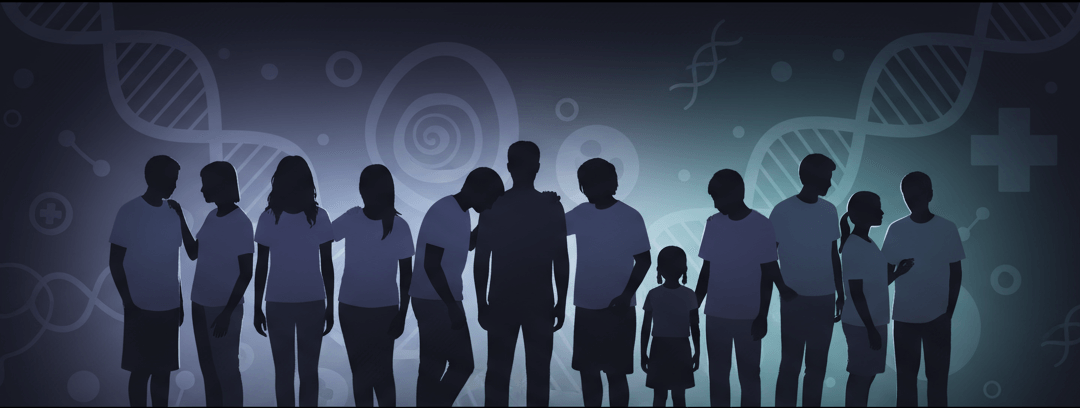This past May, our hearts broke twice. Within just two weeks, the Pompe community said goodbye to two extraordinary advocates: Maryze Schoneveld van der Linde with the IPA, and our beloved Tiffany House with AMDA/IPA. These weren’t just losses. They were seismic shifts that reminded us how precious and fragile our connections truly are.
Both women poured themselves into our community with fierce dedication. They championed patients, supported families, and pushed research forward with unwavering hope. While we ache from their absence, their voices continue to echo through every life they touched, every family they supported, and every breakthrough they helped make possible.
But their passing illuminated something else: grief lives everywhere in our community, often in ways we don’t recognize or name. The parent who mourns the carefree childhood their child will never have. The adult with late-onset Pompe disease (LOPD) who grieves the marathon they’ll never run again. The spouse watching their partner’s strength fade, carrying the weight of tomorrow’s uncertainties.
These experiences are real, valid, and profound, yet they often go unacknowledged. We call this grief illiteracy, and it’s time we changed that conversation.
Understanding Grief: More Than We Think It Is
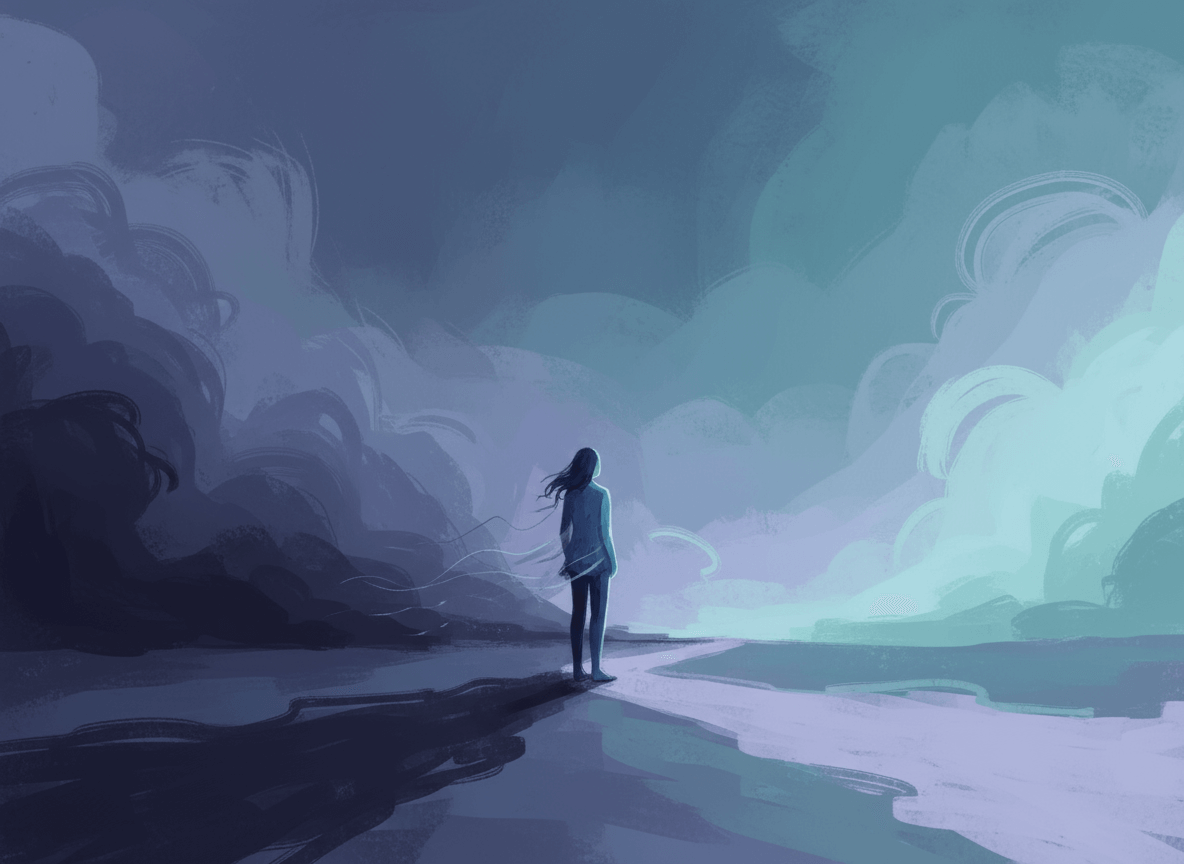
When most people hear “grief,” they think of funeral flowers and black clothes. But grief is so much bigger than that. It’s our heart’s natural response to any meaningful loss—whether that’s a person, our health, our independence, or the future we thought we were heading toward.
In the Pompe world, grief wears many faces. It might be the crushing moment of diagnosis, when everything you thought you knew about your family’s future shifts. It could be the quiet sadness that settles in when climbing stairs becomes impossible, or the complex emotions that surface when celebrating a milestone your child reached differently than you once imagined.
For decades, we’ve talked about grief in “stages”: denial, anger, bargaining, depression, acceptance. While these can be helpful guideposts for some, modern research shows us that grief is far messier and more personal than any neat progression suggests. It spirals, it surprises us, it shows up at 2 AM or in the middle of a good day. And that’s not wrong. That’s human.
Most importantly, grief isn’t weakness. It’s love with nowhere to go. It’s hope recalibrating. It’s proof that something mattered deeply to us.
The Many Faces of Grief
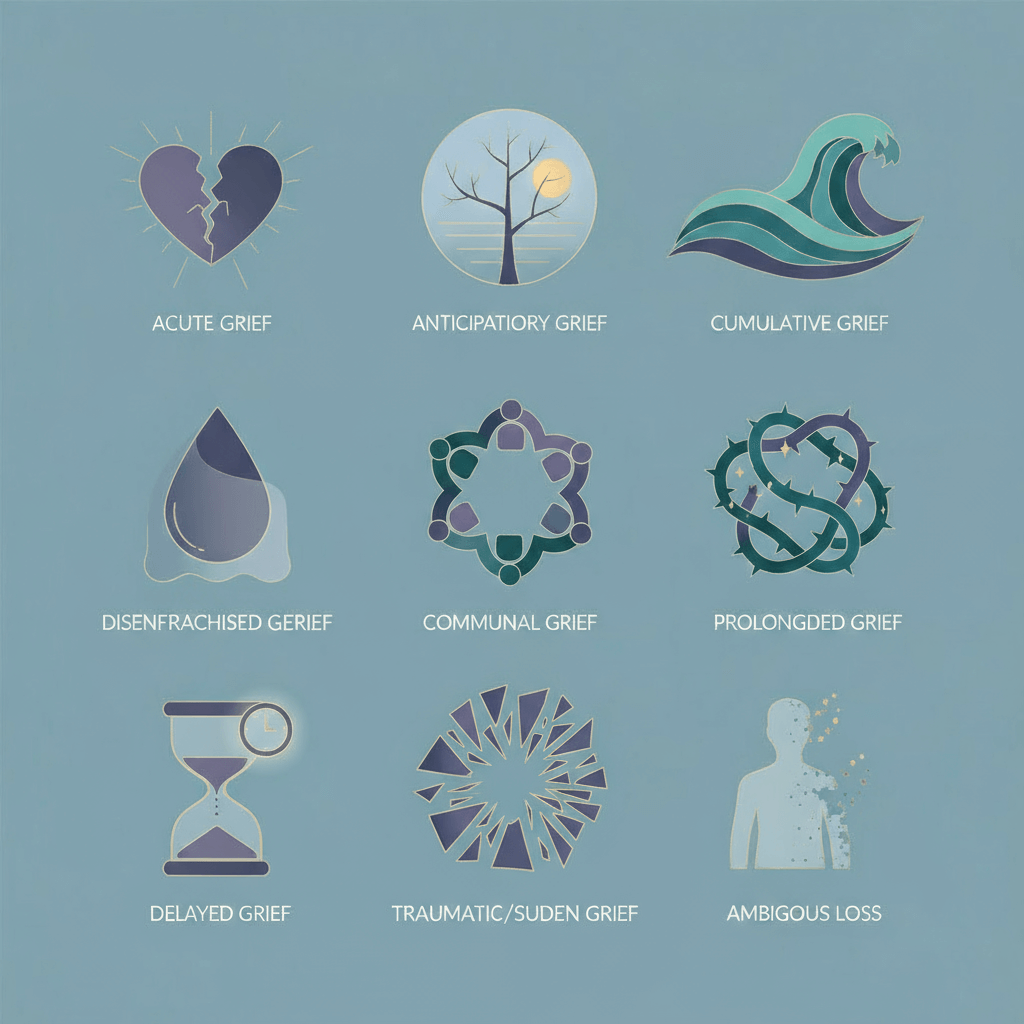
Grief isn’t one-size-fits-all. Recognizing its different forms helps us understand our own experience and extend compassion to others walking this path.
When Loss Hits Hard and Fast
Acute grief strikes like lightning. It’s the immediate, overwhelming sorrow that follows sudden loss. Everything feels raw, disorienting, and all-consuming. If you’ve ever received devastating news and felt like the world stopped spinning, you know this grief.
Mourning What’s Coming
Anticipatory grief arrives before loss happens, when we’re watching decline unfold or preparing for an uncertain future. It’s mourning in present tense, grieving today’s changes while dreading tomorrow’s. This kind of grief can feel especially confusing because hope and sorrow live side by side.
When Grief Keeps Coming Back
Chronic grief doesn’t follow timelines. It resurfaces with each new challenge, each lost ability, each adjusted dream. In progressive conditions like Pompe, this grief can feel particularly persistent as losses accumulate over time.
The Grief Nobody Talks About
Disenfranchised grief lives in the shadows. It’s the mourning that society doesn’t quite know how to acknowledge. Grieving lost independence, missed milestones, or the “normal” life that never was. These losses are real, but they often lack the rituals and recognition that help us heal.
Grieving Together
When our community loses someone like Tiffany or Maryze, we experience collective grief. It’s different from individual mourning—it’s shared, communal, and often expressed through the very advocacy and connection that defined their lives. Communal grief can actually strengthen our bonds while honoring those we’ve lost.
When Grief Gets Stuck
Sometimes grief doesn’t soften with time. Prolonged grief remains intense and interfering, making it difficult to engage with life. If grief feels overwhelming months later, reaching out for professional support isn’t failure. It’s wisdom.
Delayed and Sudden Grief
Sometimes we push grief aside to handle immediate needs, only to have it surface unexpectedly later. Other times, sudden loss leaves us reeling without preparation. Both are normal responses to abnormal situations.
The Unclear Losses
Ambiguous grief accompanies losses that lack clear boundaries—when someone is physically present but changed in fundamental ways, or when the future feels indefinitely uncertain. This grief can be particularly challenging because there’s no clear “before” and “after.”
Time, Healing, and the Long Road Forward
“Healing doesn’t mean forgetting. It means learning to carry both love and loss, finding ways to honor what we’ve lost while embracing what remains.”
“How long does grief last?” It’s the question everyone asks and no one can definitively answer. The American Psychological Association suggests six months to two years, but real grief doesn’t consult calendars. It ebbs and flows like tides, sometimes gentle, sometimes overwhelming.
What we do know is this: healing doesn’t mean forgetting. It means learning to carry both love and loss, finding ways to honor what we’ve lost while embracing what remains.
If grief becomes too heavy to bear alone, if it’s preventing you from caring for yourself or others, or if the darkness feels impenetrable, please reach out. Grief counselors and mental health professionals can provide tools and support that make the journey more manageable.
How Grief Shows Up in Your Life
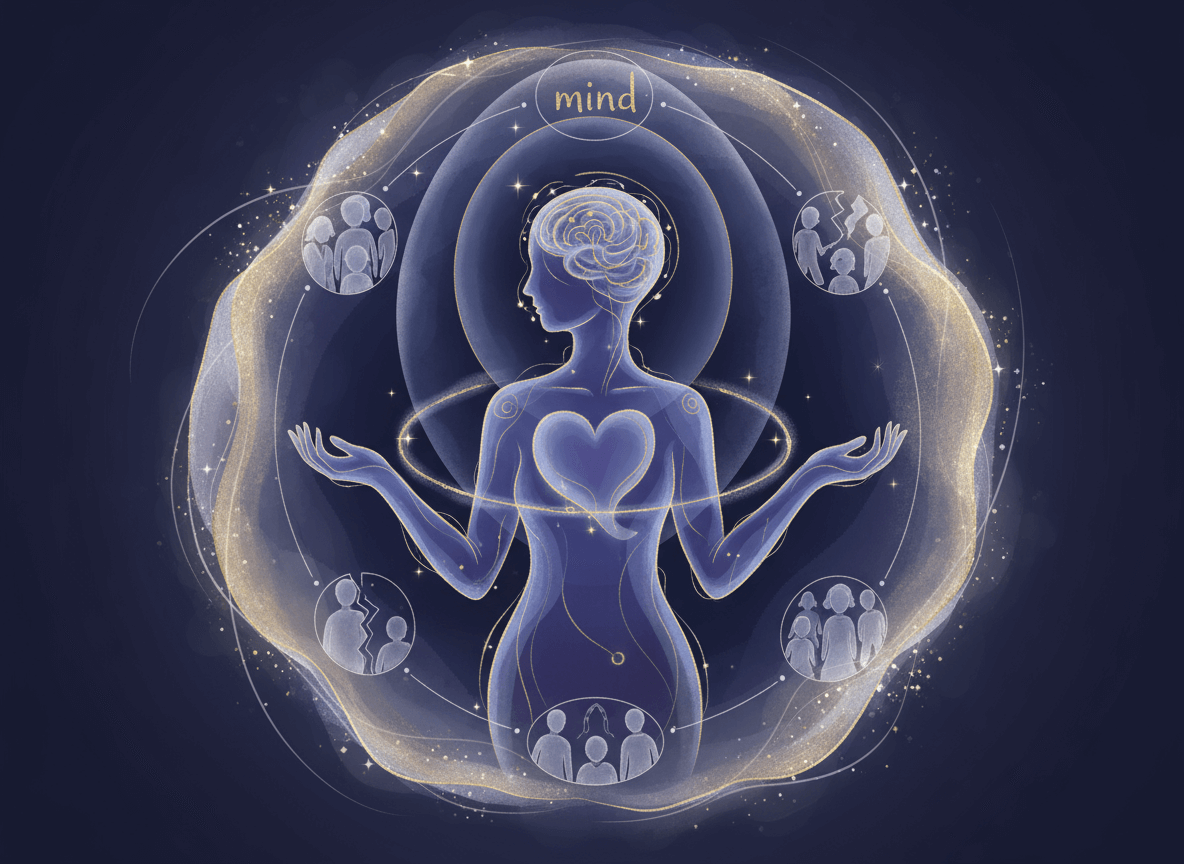
Grief doesn’t stay neatly contained in our hearts. It affects our entire being, often in ways that surprise us.
Emotionally, you might experience deep sadness, anger, guilt, or even relief. Sometimes you feel everything at once; sometimes you feel completely numb. Both are normal.
Physically, grief can manifest as exhaustion, sleep problems, appetite changes, headaches, or getting sick more often. Your body is processing trauma, and it shows.
Mentally, “grief brain” is real. Concentration becomes difficult, memory gets fuzzy, and simple decisions feel overwhelming. This isn’t permanent, but it’s perfectly normal.
Socially, you might withdraw from others or desperately seek connection. Work might feel impossible, or it might become your refuge. There’s no right way to navigate relationships while grieving.
Spiritually, grief often triggers deep questions about meaning, faith, and purpose. Some find comfort in spirituality; others feel abandoned by it. Both responses are valid parts of the human experience.
For those in the Pompe community, these effects may interweave with the challenges of managing a rare disease, but recognizing them as grief responses helps reduce self-judgment and creates space for healing.
Living Alongside Grief
Here’s something important: we don’t “get over” significant losses. Instead, we learn to carry them differently. Grief becomes part of our story, woven into who we are rather than something to overcome.
In the Pompe community, we see this transformation constantly. Families channel their grief into advocacy. Patients use their experience to guide others. Caregivers find purpose in connection and support. This doesn’t erase the pain, but it gives it meaning.
Tiffany and Maryze exemplified this beautifully. Their work grew from their own encounters with loss and challenge, becoming legacies that continue inspiring hope and change. They showed us that grief and purpose can coexist, that our deepest sorrows can fuel our greatest contributions.
Living with grief also means expecting its unpredictability. It might surface during celebrations, anniversaries, or quiet moments when memories catch us off guard. These waves don’t signal setbacks. They remind us that love persists beyond loss.
Breaking Down Grief Illiteracy
Grief illiteracy is our collective inability to recognize, understand, or respond appropriately to loss. It shows up in harmful phrases, unrealistic expectations, and the dismissal of certain types of grief.
We see grief illiteracy when people say things like “At least they’re not suffering anymore” or “You should be grateful it’s not worse.” We see it in the pressure to “bounce back” quickly or the assumption that certain losses don’t warrant grief. We see it in the silence that surrounds miscarriage, divorce, job loss, or the gradual erosion of abilities.
For rare disease families, grief illiteracy can be particularly isolating. The ongoing nature of many losses, the complexity of emotions around diagnosis and progression, and the absence of clear societal scripts for these experiences can leave people feeling misunderstood and alone.
But here’s the hopeful truth: grief literacy can be learned. When we understand grief better (its varieties, its timeline, its normalcy) we become better equipped to support ourselves and others.
In the Pompe community, this matters enormously. When we can name anticipatory grief, validate disenfranchised loss, and recognize the ongoing nature of chronic grief, we create space for authentic healing and connection.
Building a More Grief-Literate Community
“Grief isn’t weakness. It’s love with nowhere to go. It’s hope recalibrating. It’s proof that something mattered deeply to us.”
Becoming grief literate doesn’t require professional training. It requires heart, attention, and the willingness to sit with discomfort. Here’s how we can all grow:
Acknowledge what you see. A simple “I see you’re hurting, and I’m sorry” can be more healing than elaborate attempts to fix or explain.
Listen without the urge to solve. Sometimes people need to be heard more than they need advice. Let them share their grief in their own way and time.
Validate all forms of loss. Remember that grief isn’t limited to death. Diagnosis, health changes, lost dreams, and uncertain futures all deserve recognition and compassion.
Skip the silver linings. Phrases like “Everything happens for a reason” or “At least…” often minimize pain rather than comfort it. Presence matters more than platitudes.
Respect individual timelines. Grief doesn’t follow schedules. Be patient with yourself and others as healing unfolds.
Educate yourself about grief’s complexity. The more we understand grief’s many forms, the better we can support our community.
Offer practical support. Sometimes a meal, a ride to an appointment, or help with errands speaks louder than words.
Create safe spaces for authentic conversation. Encourage openness about grief in families, support groups, and community gatherings.
Share your own experience when appropriate. Vulnerability can help others feel less alone in their journey.
| Instead of… | Try… |
| “You should be over this by now.” | “I’m here with you through this.” |
| “At least they’re not suffering anymore.” | “This loss is so hard. Take all the time you need.” |
| “Don’t cry, be strong.” | “I don’t have perfect words, but I care about you.” |
Carrying Grief Forward with Grace
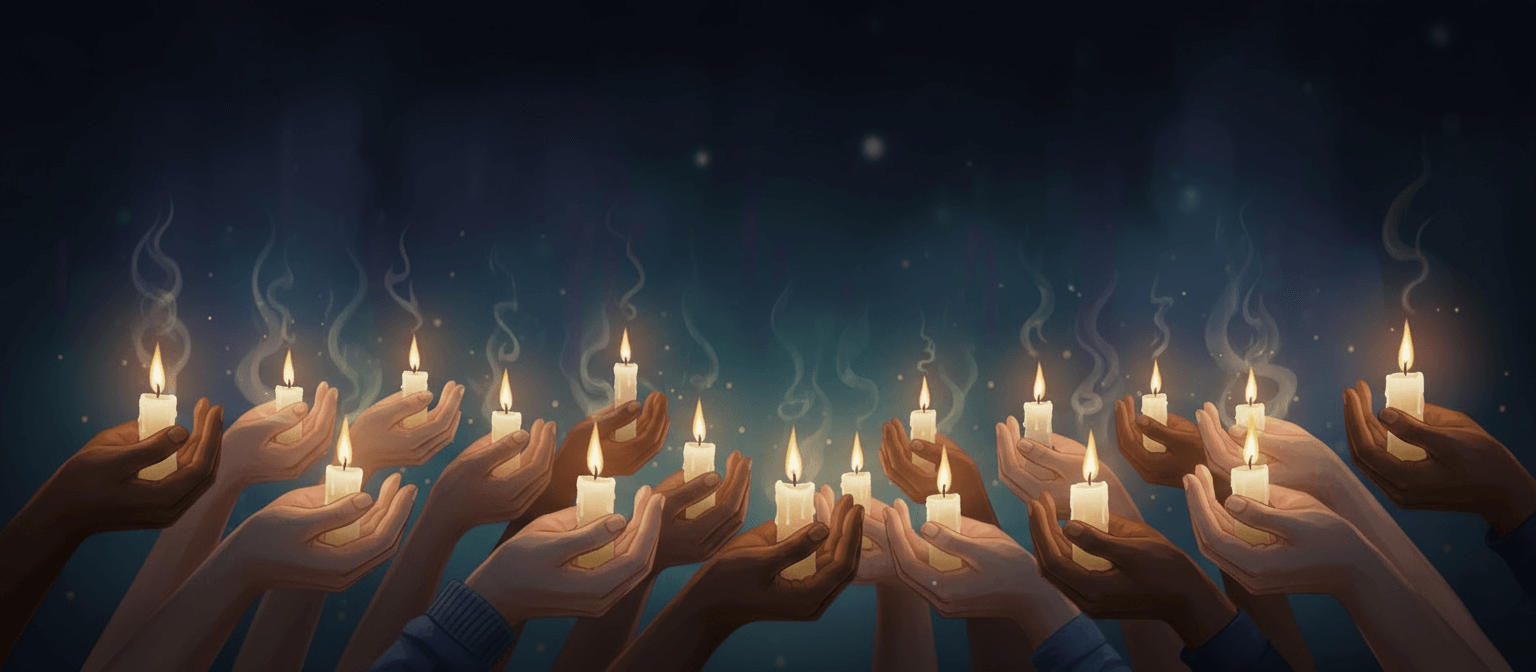
Grief doesn’t disappear, but it can be transformed into something meaningful and even beautiful. In the Pompe community, we see this happen constantly—love channeled into advocacy, loss transformed into connection, pain becoming purpose.
Honor through storytelling. Keep memories alive by sharing stories of those we’ve lost and celebrating the impact they made. Tiffany’s laugh, Maryze’s dedication. These become part of our community’s ongoing narrative.
Create meaningful rituals. Light candles on anniversaries, write letters to loved ones, or dedicate advocacy work to their memory. These acts help maintain connection while acknowledging change.
Find strength in community. Connect with others who understand the unique challenges of rare disease. Shared experience can make grief feel less isolating and more purposeful.
Channel grief into action. Many find healing in advocacy, volunteering, or supporting research. This doesn’t erase the pain, but it can give it direction and meaning.
Allow room for joy alongside sorrow. Carrying grief doesn’t mean abandoning happiness. Both can coexist, creating a richer, more authentic life experience.
“We don’t ‘get over’ significant losses. Instead, we learn to carry them differently. Grief becomes part of our story, woven into who we are rather than something to overcome.”
As we close, we return to Tiffany and Maryze. These two women showed us that even in loss, there can be profound purpose. Their lives remind us that grief and hope aren’t opposites; they’re companions on the journey toward a more compassionate, connected community.
When we build grief literacy, we don’t just learn about loss. We learn about love. We discover that acknowledging pain doesn’t increase it; it transforms it. We find that our deepest sorrows can become our greatest sources of connection and strength.
In the end, grief literacy isn’t just about understanding loss. It’s about understanding life itself, in all its complexity and beauty. And in that understanding, we find the foundation for a community that truly sees, supports, and celebrates each person’s journey, no matter where it leads.
Resources for Support
If you’re in crisis or need immediate help:
- 988 Suicide & Crisis Lifeline: Call or text 988, available 24/7 988 Lifeline | AFSP for free, confidential support
- Crisis Text Line: Text TALK to 741-741 Suicide prevention resources | AFSP to connect with a trained crisis counselor
- Veterans: Press 1 when calling 988 Suicide prevention resources | AFSP for specialized support
For ongoing grief support:
- GriefShare: Find local grief recovery support groups Need Help Dealing with Grief? – GriefShare at www.griefshare.org
- NAMI HelpLine: Free, confidential nationwide service providing emotional support and mental health resources NAMI HelpLine | National Alliance on Mental Illness (NAMI) at 1-800-950-NAMI (6264)
Professional help:
- Contact your healthcare provider for referrals to grief counselors or therapists
- Many insurance plans cover mental health services, including grief counseling
- Employee Assistance Programs (EAPs) often provide free counseling sessions
Remember: Reaching out for help is a sign of strength, not weakness. You don’t have to navigate grief alone.

